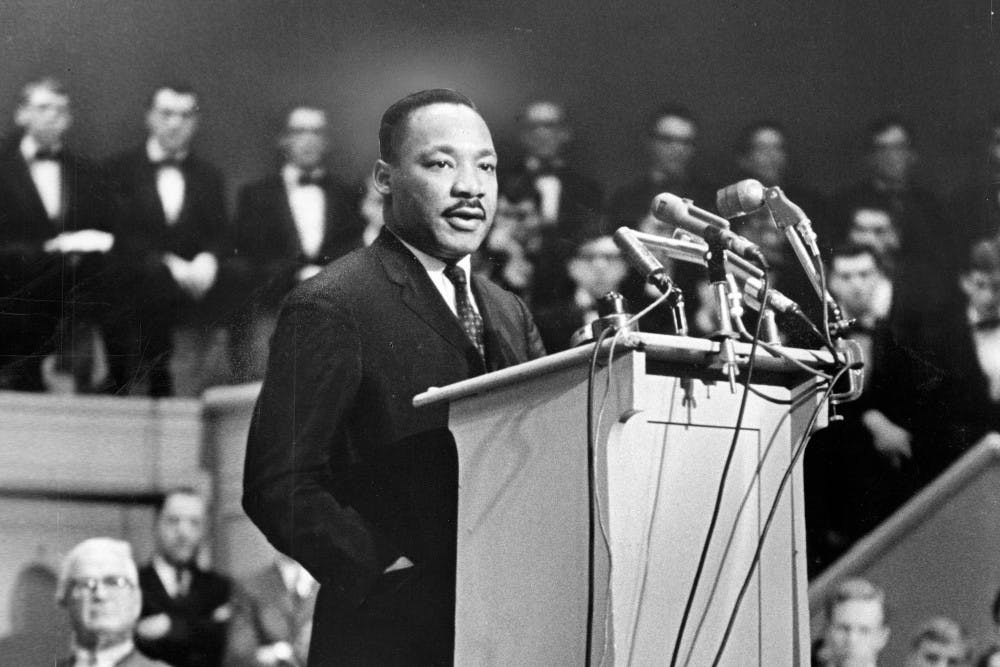Rosa Parks and Martin Luther King Jr. are widely known African-American trailblazers for their achievements and steps they took to unify our country, amidst racial discrimination. However, there are many who came before and after them that go unnamed and unrecognized.
February, the shortest month of the year, is Black History Month. While there is arguably greater equality between races now than there was in the 1960s during the Civil Rights Movement, there is still so much that needs to change for an America with “with liberty and justice for all.”
That is why we need Black History Month.
Black History Month can be controversial for some — according to Public Policy Polling, 46 percent of Trump voters believe that there should be a White History Month. It can also be controversial for those who believe that one month is not enough time to set aside for celebrating black history.
According to the United States History Content Standards for Grades 5-12, African-Americans are only mentioned in the curriculum when talking about slavery, civil rights movements and inequality. This omits the large history black people had before slavery, and all of the integral contributions they've given to make America what it is today.
Dr. Bambi Haggins, associate professor of film and media studies in the department of English, covers American films and television in the lens of race, class, gender and sexuality.
“We need to have Black History Month because we need to know our history, and our history is the history of all Americans,” Haggins said.
Today, black Americans still face murder at the hands of the law. Michael Brown, Alton Sterling, Philando Castile, Terence Crutcher and too many others lives have been taken by police officers in the past three years. These occurrences highlight the very relevant issues of racial inequality, racial profiling and shooting unarmed individuals.
The Black Lives Matter movement has gained support, but also a lot of skepticism and dismissive attitudes toward the issues they bring to the forefront.
Black History Month is not only a time to focus on both well-known and lesser-known black Americans, but it's also a time to truly understand the racial inequalities that still exist in the U.S.
“I think we need to understand history — black history, Latino history, women’s history, Native American history, LBGTQ history — because in order to understand where American is today, we have to understand where it has been,” Haggins said.
I have also realized how my Arizona education did not teach me the entire history of the U.S. For example, "Hidden Figures" was just now produced, even thought the story was based in the 1960s. We are just now learning about the black women Katherine G. Johnson, Dorothy Vaughan and Mary Jackson, and their contributions to the space program.
With fundamental education missing in our history books and in our discussions, we are failing to adequately teach history. Some students have jump-started discussions and created a way for the community to be involved in Black History Month.
Muralist Kyra Trent, an interdisciplinary studies senior with concentrations in social transformation and African-American studies, helped the Black Student Union on ASU's West campus to create “I Am….” On Feb. 22, the mural will be featured at the Art Space West gallery during the Spoken Word Night Collections Closing Reception.
"I Am..." is a mural focused on the ideas of James Baldwin's unpublished manuscript that was made into the movie "I Am Not Your Negro" and the ideas surrounding racial stereotypes, intersectionality and reclaiming identity, Trent said.
"I don't think there can ever really be enough of celebrating what black people have contributed to the country, just given the fabric and the history of coming here not as indigenous people, but coming here taken from our indigenous land," Trent said.
Other events and workshops for Black History Month are occurring all over the valley and on ASU’s four valley campuses. On the Downtown Phoenix campus, Jeopardy will be held on Feb. 17., while on the Polytechnic campus, Jazz in the Park is planned to take place on Feb. 28. ASU’s Black History Month Event Calendar lists all the events for the month.
This month is a time for Americans to take education into their own hands because the month only allows for fragments of history to be learned and does not represent everyone who played a role.
"Until our history is really our history, Black History Month will continue to be of vital importance," Haggins said.
Reach the columnist at afsuthe1@asu.edu or follow @a_sutherland10 on Twitter.
Editor’s note: The opinions presented in this column are the author’s and do not imply any endorsement from The State Press or its editors.
Want to join the conversation? Send an email to opiniondesk.statepress@gmail.com. Keep letters under 300 words and be sure to include your university affiliation. Anonymity will not be granted.
Like The State Press on Facebook and follow @statepress on Twitter.




